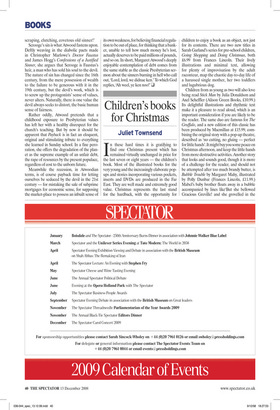BOOKS
scraping, clutching, covetous old sinner!’ Scrooge’s sin is what Atwood fastens upon. Deftly weaving in the diabolic pacts made in Christopher Marlowe’s Doctor Faustus and James Hogg’s Confessions of a Justified Sinner, she argues that Scrooge is Faustus’s heir, a man who has sold his soul to the devil. The nature of sin has changed since the 16th century, from the mere possession of wealth to the failure to be generous with it in the 19th century, but the devil’s work, which is to screw up the protagonists’ sense of values, never alters. Naturally, there is one value the devil always seeks to distort, the basic human sense of fairness.
Rather oddly, Atwood pretends that a childhood exposure to Presbyterian values has left her with a healthy disrespect for the church’s teaching. But by now it should be apparent that Payback is in fact an eloquent, original and stimulating tribute to everything she learned in Sunday school. In a fine peroration, she offers the degradation of the planet as the supreme example of an unfair debt, the rape of resources by the present populace, regardless of cost to the unborn future.
Meanwhile the recession, in Atwoodian terms, is of course payback time for letting ourselves be seduced by the devil in the 21st century — for mistaking the sale of subprime mortgages for economic sense, for supposing the market-place to possess an inbuilt sense of its own weakness, for believing financial regulation to be out of place, for thinking that a banker, unable to tell how much money he’s lost, actually deserves to be paid millions of pounds, and so on. In short, Margaret Atwood’s deeply enjoyable contemplation of debt comes from the same stable as the classic Presbyterian sermon about the sinners burning in hell who call out, ‘Lord, lord, we didnae ken.’ To which God replies, ‘Ah weel, ye ken noo!’ ❑










































































 Previous page
Previous page